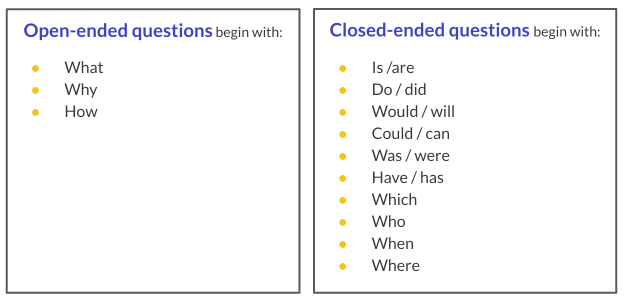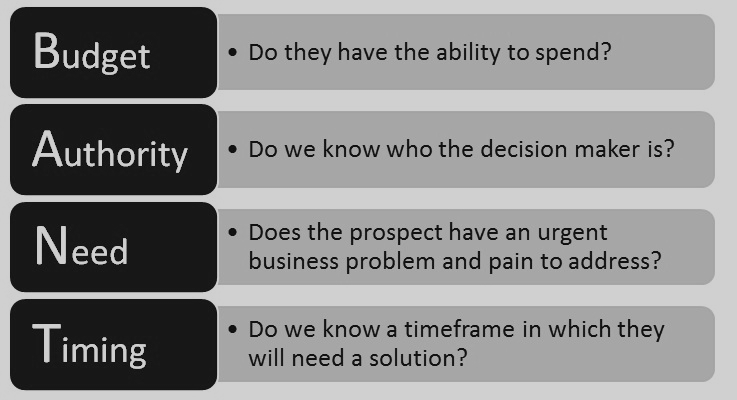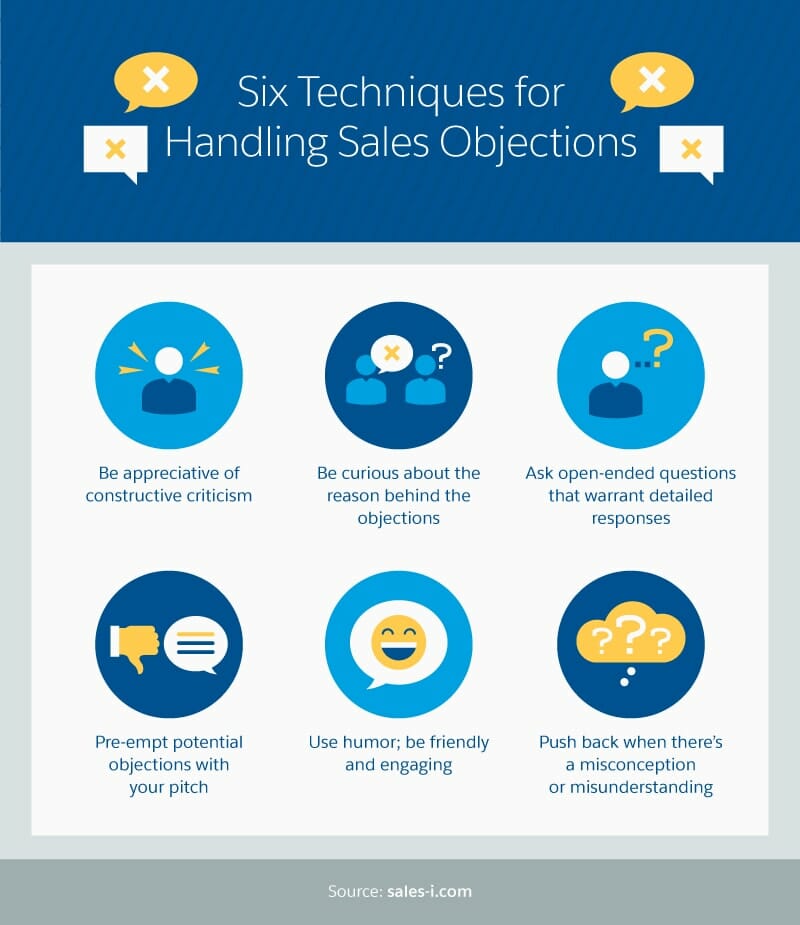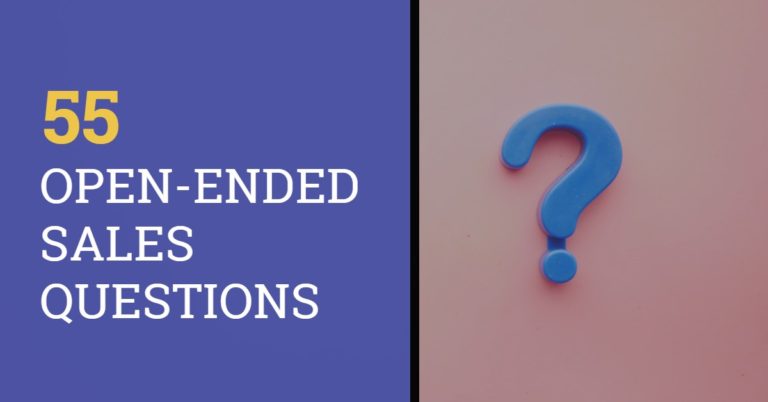Open-ended questions are essential to success in sales. Why? Because they allow reps to get inside the head of their prospects and build rapport with them, while uncovering their pain points, establishing their needs, and clearly articulating the value of an offering.
In this article, we’ll outline the difference between open and closed sales questions, talk about how to use them in your business, share examples, and highlight critical mistakes to avoid.
What Are Open-Ended Sales Questions?
An open-ended sales question is a probing query that helps sales reps better understand their prospects. They can be used at any time during the consultative sales process, from initial conversations with a potential customer up until the close of a deal.
A few characteristics of open-ended sales questions include:
- They are conversational.
- They usually involve the Five W’s: Who, What, When, Where and Why, as well as How. (Some people call these the Six Ws—even though “How” doesn’t start with W).
- They don’t have a set pattern, meaning there is no formula or structure to them.
- They usually require thought before someone answers.
- They are naturally subjective, not objective. That is to say, they’re often more about personal feelings, than set-in-stone facts and figures.
When used in sales calls, open-ended questions enable sales reps to create dialogue with prospects and learn important information about them that can help close a deal.
Open-Ended vs. Close-Ended Sales Questions
Close-ended sales questions aim to uncover important information about prospects—just like their open-ended counterparts. The main difference is that close ended sales questions lead to specific answers, like a yes or no, or a multiple-choice option.

Because of this, open-ended questions allow the control of a conversation flow between sales rep and prospect, while close-ended questions keep reps in the driver seats at all times.
Here’s a quick example:
You could ask a prospect, “Do you have any other questions that I can answer for you today?” which is a close-ended question because the answer is either yes or no. Or, you can ask, “What other questions can I answer for you today?” which opens the door to dialogue.
Why Sales Teams Should Ask Open-Ended Sales Questions
Now that we know what open-ended sales questions are, let’s talk about why you should ask them. Here are three important reasons to ask your prospects open-ended questions:
Engage Prospects
Open-ended sales questions encourage prospects to talk about things they care about. It’s easier to engage in conversations that we find interesting and meaningful.
Once a prospect is engaged, you’ll find that building rapport with them, learning their pain points, and closing a deal is a much simpler process. This is because your conversation will feel like a true dialogue, not a sleazy sales pitch.
Discover Pain Points
Engaged prospects talk more, which will give you plenty of opportunities to discover their true pain points. You can then use this understanding to frame your company’s products and/or services in the appropriate ways and increase your chances of closing.
For example, if, after asking an open-ended sales question, a prospect says, “Our current software is just so hard to use,” you can talk about how intuitive your solution is.
Build Trust
Finally, open-ended sales questions build trust because they demonstrate to prospects that you actually care about their thoughts and opinions. You’re basically inviting them to tell you everything about a specific topic—the good, the bad, and the ugly.
When a prospect feels like they can tell you exactly what they’re looking for in a product, any concerns they have, etc., they’ll naturally start to trust and open up to you.
55 Examples Of Open-Ended Sales Questions (By Category)

In this section, you’ll find 55 examples of open-ended questions in sales, separated into 10 different categories based on when they’re best used.
Remember, as Sam Parker, sales trainer and author of Just Sell.com says, you are asking the prospect to answer the question. You want to hear what they have to say, meaning no leading, no prompting, and no interrupting.
Rapport Building Questions
When working to build a relationship with the potential customer and establish a personal connection, use Rapport Building Questions.
As Xactly.com explains, rapport-building requires you to really get to know your prospects. Without this level of intimacy, you can’t consult the account. You have to know what they want and need so you can position your product or service as the perfect solution.
Examples:
- What needs to happen today to make this appointment worth your time?
- What motivated you to take this call with me?
- How do you evaluate vendors in this [Area/Field/Industry]?
- What concerns do you have about making changes in this area?
- What part of your [Process/Product/Service] do you enjoy the most?
- What have I not covered that you would like to know more about?
- How’s business? Have there been any changes since we last spoke?
Qualifying Questions
It’s important to evaluate new leads and determine where they are in the buying process. Qualifying questions help determine a prospect’s interest level, what they think of your sales approach so far, and what your next move should be to close the deal.

Examples:
- When do you think you might assess your solutions in [Your Industry/Category]?
- What do you think about our offer so far?
- How should we move forward after today?
- Do you have any questions about our product that I haven’t answered yet?
- What’s your budget look like for this [Project/Product/Service]?
- What’s changed since the last time we spoke about this?
Needs-Based or Pain-Based Questions
When you want to learn more about the challenges your prospects face, try Needs-Based Questions, aka Pain-Based Questions. Just be cognizant of the pains your offering solves. In other words, don’t ask about areas that your product or service doesn’t address.
Each of the following open-ended sales questions aims to uncover important details about a prospect’s current system and why it isn’t working for them.
Examples:
- Why isn’t your particular solution and/or process working for you?
- What’s preventing you from hitting your goals?
- What are some challenges you’re looking to solve?
- What do you think about our offer so far?
- What improvements are you looking to make in your department?
- Have you tried to resolve this problem before? What happened?
Impact or Benefit-Driven Questions
Wanting to learn the best way to close a potential customer? Ask them Impact or Benefit-driven questions to discover the product features your prospects find most intriguing. Then, use their answers to these sales questions to inform your approach.
To prepare, review the features and benefits of your product or service so you can ask good open-ended questions to potential customers.
Examples:
- How important would you say [Feature] is to your [Industry/Process/Business]?
- How much time do you spend [Performing a Specific Task]?
- How would you spend the extra 30-60 minutes a day if you didn’t have to [Task]?
- If this problem remains unsolved, how will it affect your business in the future?
- How do you think you could avoid issues like A, B, and C?
New Future or New Reality Questions
These kinds of questions help prospects visualize what it will feel like to achieve their goals using your company’s products and/or services. As such, they’re quite powerful.
Examples:
- How do you think changing this area would improve your day-to-day process?
- What would you like to achieve in the next year by making this change?
- If time and money were no object and you had full authority to do whatever you wanted, what would you change about your current system?
- If you were to describe your situation in three years, what would you want to be different from what you have today?
- If you could go back in time, what would you change about your business?
Objection-Based Questions
Objection-based questions are designed to uncover objections before they derail your sales process. Or, at the very least, give you the details you need to disqualify leads and move on.
Examples:
- The common objection is, “I need to discuss this with my supervisor,” so the question would be: “Who else is involved in making these types of decisions?”
- The common objection is, “I can’t afford this right now,” so the question would be: “What budget do you have allocated for something like this?”
- The common objection is, “I’m not interested in your product or service right now,” so the question would be: “When are you interested in learning how I can save you X% with this product/service?”
- What concerns, if any, do you have so far?
- What else would you like to talk about?
- What would stop you from making a change today?

Buyer History Questions
Buyer-History Questions help to uncover prospects’ past experiences and purchasing habits. They’ll also help you understand the state of a prospect’s relationship with their current provider, which can have significant implications for your sales process.
Examples:
- What has your past purchase experience with [Product/Service] been like?
- When was the last time you evaluated something like this?
- Why weren’t you satisfied with your previous vendor?
- How would you describe the level of service you receive from your current provider?
- What measures have you taken to fix your problems with your current solution?
Clarifying Questions
What if a prospect doesn’t give you enough information on a specific topic? Try asking open-ended questions that help clarify their thoughts and opinions. These are great for directing sales conversations, while allowing prospects to maintain control.
Examples:
- Can you tell me more about that?
- What do you mean when you say [X]?
- Would you be able to give me an example of that?
- Can you give me more information on [X]
- How did that affect your team?
Closing Questions
The best open-ended sales questions will help you take prospects from new leads to paying customers—but only if you ask the right ones at the right times. Here are a few questions that will help you “seal the deal” and earn the commission bonus you’ve been eyeing:
Examples:
- What’s your timeline for making a purchase?
- Who else are you comparing us against?
- What would it look like if our products helped you overcome your challenges?
- If we make a deal, what would it mean for you personally?
- What else can I do to help you finalize your decision?
- When can we get started?
Open-Ended Questions to Ask After Closing
You know the saying, every ending is a new beginning.
A closed deal is really just the beginning of your company’s relationship with a new customer. That’s why it’s important to ask engaging sales questions after closing to ensure customers are enjoying their experience and want to continue doing business with you.
Examples:
- What caused you to reach out to us?
- How can we help you get started with [Product/service]?
- Now that you’re a customer, what can we do to make sure your experience is perfect?
- What questions do you have about the onboarding process?
Tips to Ask Better Open-Ended Sales Questions
Once you’ve prepared your sales discovery questions for each stage of your prospect meeting, you should think about how to ask open-ended questions in sales.
Everything from the order in which you ask your questions to the various ways you transition from one to the next should be considered so that your flow seems natural and your prospects never feel like your conversations are overly structured.
Sales professionals who have trained use a series of needs-based questions to uncover the prospect’s pain.
Similar to a traditional funnel, the pain questions start broad; i.e., “What are some things you would like to change about your current system/provider/product line?” They then move to more specific questions like, “Can you give me an example?”
Invert the funnel. Funnels are broad at the base and build up to a point. When asking open-ended questions for sales, invert the funnel by asking board queries first, then working your way down to more specific ones.
For example, ask a simple, non-threatening question to start such as, “What should I know about your business? Then look for areas to explore in greater detail based on the response you receive, using pointed questions to reveal important details.
Exude curiosity. It’s important to show sincere interest during the open-ended questioning process. Think about how you can help your prospects rather than the sales commission they represent. Nobody wants to interact with sleazy sales reps.
If you can make your sales calls about your prospects instead of about you, your company, or even the products and services you sell, you’ll have more success.
Shut your mouth. One of the best things you can do on a sales call is listen.
Let your prospects speak about the things on their minds. Ask questions that give you a deeper understanding of their circumstances. Then adjust your approach to address their wants, needs, and concerns. Doing so will form a bond between you and potential customers.
As leadership guru Michael Hyatt says, “you will often find that people volunteer amazing amounts of information that you would have never obtained any other way.”
Keep it personal. Preparation is vital to a successful sales call. However, over-preparedness can be extremely dangerous because it can make your exchanges feel impersonal and robotic, like you’re reading from a script.
Work hard to make your conversations feel personal. That way you can build rapport with potential customers and gain their trust.
This isn’t an invitation to not prepare for your sales calls. Instead, it’s a warning to not let your preparation distract you from your goal: to get to know your prospects so that you can sell them products and/or services that will make their lives better.
5 Mistakes Reps Make When Asking Open-Ended Sales Questions:
1. Answering your own questions. While it may feel natural to suggest certain answers to the questions you ask prospects, doing so isn’t advised. This is because your suggestions can alter what a prospect was planning to share with you.
Instead, ask your questions and then zip your lip. That way you learn exactly what’s on your prospects mind, without it being colored by your own input.
2. Forgetting to listen to the client. Similar to answering your own questions, forgetting to listen to the potential customer defeats the purpose of asking open-ended questions.
3. Interrogating clients. Rapid fire questions that dig a little deeper than a person wants feel more like an interrogation than a conversation, which is not going to help you build rapport.
Be sure to ask enough follow up questions to gain a better understanding of your leads, but not so many that people wonder if they should have a lawyer present.
4. Asking too many “why” questions. “Why” is one of the Five Ws, however it can be tricky to ask a “why” question without sounding accusatory. As Arden Coaching points out, “Why did you do that?” is more pointed than “What did you use as the basis for your actions?”
You can ask why, of course. But be careful about how many times you ask it and the tone you use when asking, so as not to offend your prospects.
5. Jumping straight to a solution. Remember, this part of the sales process is all about building relationships, not pitching your product or services.
If you notice that your prospect has a problem that your product or service can help with, resist the temptation to share information about it immediately. Instead, save it for the appropriate time. Remember, good sales come to those who wait.
Ready. Set. Question.
Asking consultative selling questions will give you the chance to listen to your prospects and build relationships with them. Once done, you’ll be in a much better position to close deals because you’ll understand their pain points and can adjust your sales approach to suit.
Just remember, the way you ask your open-ended sales questions matters. Ask them correctly and you’ll harvest new qualified opportunities for your business, while optimizing your sales funnel and improving team efficiency. Win!
Perhaps most importantly, however, open-ended sales questions allow you to prioritize your prospects to optimize your sales funnel for efficiency and success.
______
Questions or comments? Contact SPOTIO at [email protected] or comment below.
SPOTIO is the #1 field sales engagement platform designed specifically for outside sales managers and reps to optimize their field sales efforts.
Want to see a product demonstration? Click here to see how SPOTIO can take your sales game to the next level.
____________________________________
Sources:
Saltis, Sam. “87 Open-Ended Sales Questions Every Digital Agency Should Ask in Every Buying Cycle.” www.coredna.com. 6 November 2018. Web. 15 November 2018. < https://www.coredna.com/blogs/open-ended-sales-questions#>.
“Open-ended Questions Require and Answer Beyond “yes” or “no”!” richardson.com. Web. 16 November 2018. < https://www.richardson.com/sales-resources/open-ended-sales-questions/>.
Rose, Lisa. “Open-Ended Questions for Sales: How to Get Your Prospect Talking.” Brooksgroup.com. Web. 15 November 2018. < https://brooksgroup.com/sales-training-blog/open-ended-sales-questions-how-get-your-prospect-talking>
Parker, Sam. “Top 30 Open-Ended Questions.” www.justsell.com. Web. 16 November 2018. Web. < https://www.justsell.com/top-30-open-ended-questions/>
Schultz, Mike. “21 Powerful, Open-Ended Sales Questions.” www.rainsalestraining.com. Web. 16 November 2018. < https://www.rainsalestraining.com/blog/21-powerful-open-ended-sales-questions>.
Scott, Jordan. “24 Open-Ended Sales Questions Your Reps Should Be Asking.” Xactlycorp.com. Web. 26 February 2018. Web. 16 November 2018. < https://www.xactlycorp.com/blog/importance-open-ended-sales-questions/>.
Alessandra, Tony. “15 Tips For Asking More Effective Sales Questions.” Blog. Hubspot.com. Web. 16 November 2018. < https://blog.hubspot.com/sales/10-tips-ask-sales-questions-si>.
Hyatt, Michael. “7 Suggestions for Asking More Powerful Questions.” Michaelhyatt.com. Web. 16 November 2018. < https://michaelhyatt.com/asking-more-powerful-questions/>.
Perry, MA, PCC, Maren. “How (and Why) to ask open-ended questions.” Ardencoaching.com. Web. 16 November 2018. < https://ardencoaching.com/how-and-why-to-ask-open-ended-questions/>.


